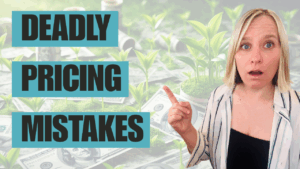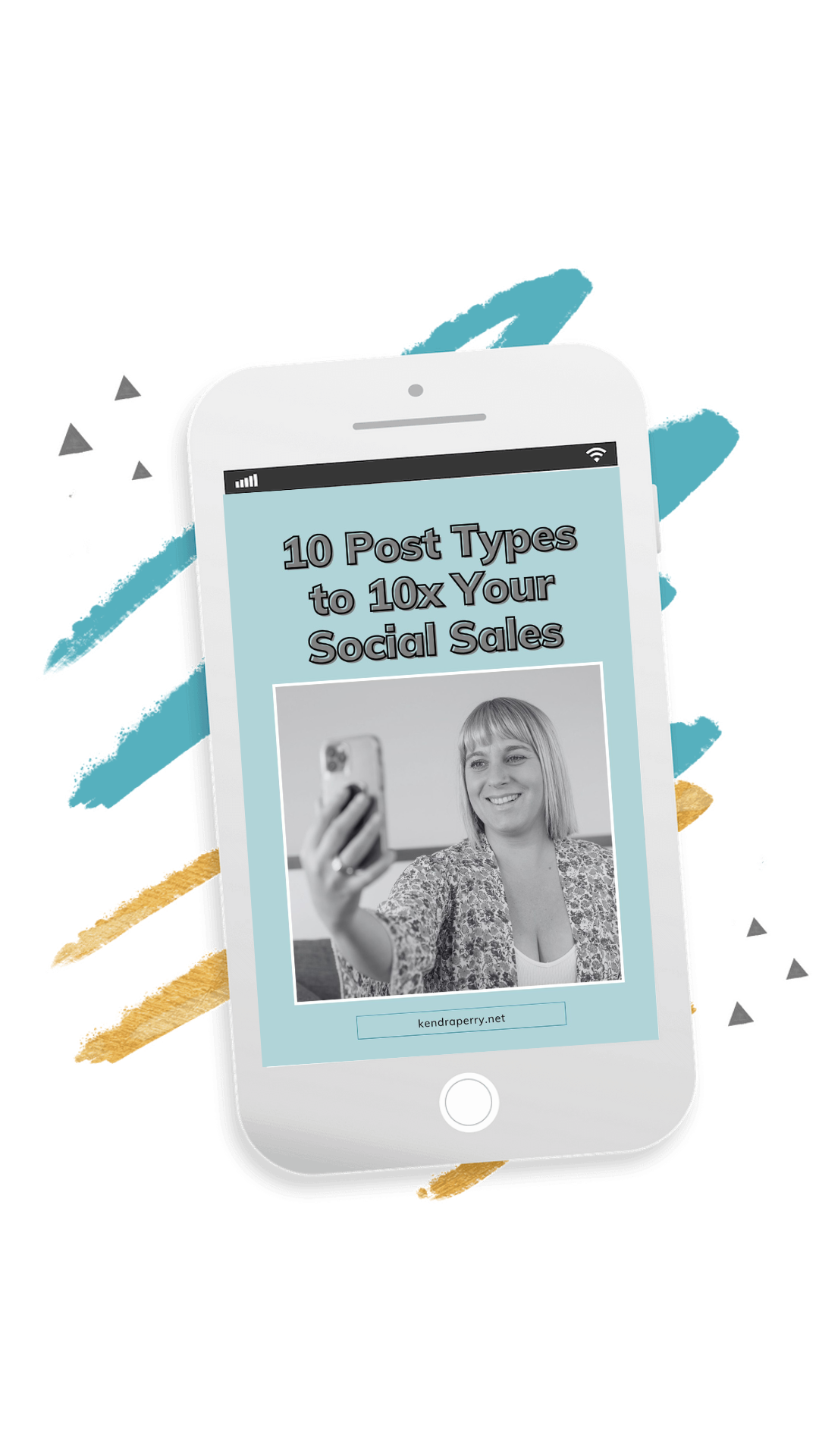In a culture obsessed with thinness, it’s easy for people to feel like they are not good enough when they don’t meet unrealistic standards. However, weight loss coaches can help clients see that their dress size does not define their worth. That is what our guest, Tomesha Campbell, knows about. As a writer, speaker, and health coach, Tomesha focuses on intuitive eating principles to help people find peace with their bodies and eat mindfully for life-long health. Today, she will discuss how to create a weight-inclusive practice, intuitive eating, and body image.
Follow Tomesha on social: https://www.instagram.com/tomeshacampbell/
Check out Tomesha’s Website: https://www.afitnessmindset.com
Want to get my step-by-step framework for enrolling 1-3 new clients every week into your Wellness Business? Grab my free Masterclass: https://training.kendraperry.net/s/lDo3UK
—
Listen to the podcast here
Building A Weight-Inclusive Practice With Tomesha Campbell
I am super excited as always. We’re going to be switching gears a little bit and covering a topic that we haven’t talked about before. We’re going to be hanging out with Tomesha Campbell. I was connected to Tomesha on Instagram by a mutual colleague, Jana Osofsky, who is an amazing Pinterest expert and a speaker at my Wealthy Health Biz Summit.
Tomesha does something interesting. She talks about how to create a weight-inclusive practice. Some of us are weight loss coaches or people who come to us with weight issues and they want to lose weight. It’s important for us to empower people to not only lose weight but in a way that doesn’t make them feel shame, feel bad or go too far to a place where it is unhealthy. We’re going to be talking about how to create a weight-inclusive practice, health on every side, intuitive eating and body image.
A little bit more about Tomesha. She is a writer, speaker and health coach who focuses on intuitive eating principles to help people find peace within their bodies and eat mindfully for lifelong health. She created A Fitness Mindset to support individuals who are looking for more information about how to make mindful choices in food without dieting or feeling deprived. I hope you enjoy this episode with Tomesha. Let’s dive into it.
—
Tomesha, welcome to the show.
Thank you so much, Kendra. I’m so happy to be here.
I’m excited to dive into a topic that we have not covered on the show before. I’m sure all our coaches and practitioners are interested in what you have to say but before we dive into that, why don’t you tell us your story? How did you get to what you’re doing?
Thank you so much for asking me that question. For me, I always have to start with my time in the Marine Corps. I was at the end of my time serving after six years and I had one of my good friends asked me a very simple question, “Are you okay?” The reason that he asked me that question was because, after six years, I was venting to him about how little I was eating and how much I was exercising to maintain our body standards in the military. That was the catalyst for me to realize the things that I was doing to maintain this facade of health were anything but healthy.
It was that moment that made a decision that I needed to figure out how can I look at health as being something outside of my body, something outside of I need to count every single calorie and spend these many hours in a gym. That’s what led me to become a health coach. I’d love to say that it was because at first, I wanted to help other people but honestly, I needed to help myself figure out how to be healthy without it having to be all restrictions.
I remember seeing my mom’s weight loss books as a kid. In high school, my girlfriends and I wanted to lose weight. I was reading Cosmo magazine and always trying to lose weight, which is crazy. When you think about your high school body, that body probably never come back. It’s crazy to think that you were wanting to lose weight in your twenties. In my late 30s, it’s a hard thing to let go of. There’s so much social conditioning around that but I still find it seeping into my life.
That’s the thing that’s so interesting because whenever I have these conversations with friends and other colleagues, I always get this resistance. There’s this assumption that I’m trying to tell people that it’s wrong for them to have a desire to lose weight. I’m like, “No, it’s very natural because we live in a culture that tells us that we need to be thin.” The difference is when you go to those extremes, it becomes unhealthy. That’s why I was trying to explain it to people. “It’s not about your desire to want to lose weight. It’s are you willing to do anything to do that?”
That’s such a good point. There’s a big difference between someone who’s severely overweight. We don’t want to shame them but it’s a health issue and people will feel better when they get to a healthy body weight. There’s a big difference between healthy body weight and the standards that maybe we’re trying to achieve that are honestly, probably pretty unrealistic for a lot of us.
It’s unrealistic but also unnecessary. There’s sometimes this presumption that I will be able to do this when I lose weight. I always try to encourage them, “You don’t need to wait to lose the weight.” I wasn’t trying to use that as a pun but there doesn’t need to be a size or a number that you reach before you could start exercising, start making changes to your diet or start competing in these different types of competitions, whether that’s, “I want to run a marathon” or these things. It’s always these limiting beliefs that people have like, “I need to wait until.” I’m like, “Why?” There’s no reason.
What did that look like for you? How did you unwind from all this societal conditioning? I’m sure there was a lot of pressure put on you when you were in the military. What did that process and journey look like for you?
It happened to be a coincidence that I was leaving the military and still going to do a contracting job where arguably, I still had a body mass to maintain. I had the opportunity in between the military and starting that position to start deciding, “How about you do not exercise for a month? How about you not count every single calorie format and see how you feel?” There was this fear of gaining weight to the point that I realized that that was the thing that I was trying to prevent myself from doing but it was all of the restrictive dietings that were contributing to the weight gain in the first place.
I’m counteracting everything I’m doing. Giving myself that opportunity to be like, “You’ve gained the weight. You’re not happy being 50 pounds more than you were. Did it stop you from exercising? No, I could still exercise. Did this stop you from making healthy choices? No, I could still make healthy choices.” It was one of those things where I had to sit there and understand some of these beliefs I had that weren’t true. I still could run and lift and in some ways, still lose weight.
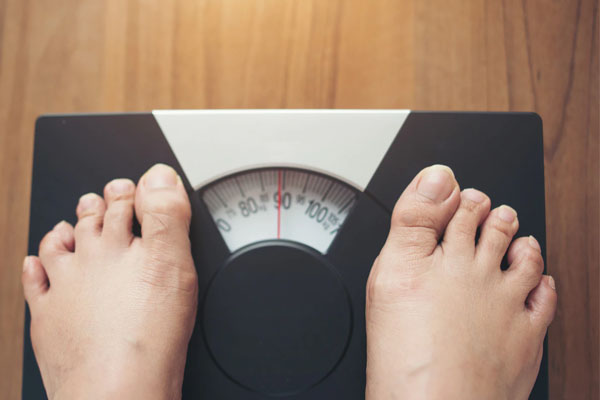
It was one of those things where I had to sit there and give myself the permission to not necessarily stick to specific standards for the sake of sticking to them and saying, “What is my body going to naturally do when I don’t try to make it into something that it isn’t?” The reality is not everybody’s going to be a size two. That’s not for all of us not. Not everybody’s going to be able to maintain specific types of diets. Some of us don’t have the personality types to do something that’s very restrictive.
When I gave myself that opportunity to look at health differently, I naturally started making more intuitive choices when it came to movement or food and realized, “If I had the opportunity to eat all the cupcakes, that doesn’t mean I’m going to. I have no interest in eating them at all. If I had the opportunity to spend hours in the gym, that doesn’t mean I have to. Maybe I want to spend a couple of hours in a gym. Maybe I want to go on a run because I love to run, not because I’m trying to lose weight.”
Exercising because you want to versus, “I have to because if I don’t, I could lose weight.” It’s interesting because we have a lot of weight-loss coaches, coaches who are niching in weight loss in the audience and dieticians. People are coming to them because they want to lose weight and that’s what they sell. What does it mean maybe to have a weight-inclusive practice? How can our audience who are doing this promote healthy habits in people versus the restriction that you ended up with?
I love this question because it gets asked a lot. For me, I always try to remind other coaches who are specifically focusing on weight loss when they asked me this. “What if my client wants to lose weight?” I’m like, “They do. That’s what they’re coming to you for. The difference is when you have a client who’s coming to you for, ‘I want to improve my health,’ but maybe weight loss is an outcome that if they achieve it, they would be okay with it. If they don’t achieve it, they wouldn’t.”
That’s the problem that happens when there’s an assumption like, “You are fat. Therefore, you must want to lose weight.” That part can be frustrating for people who are in larger bodies and have already tried the diets, done all the challenges or the bariatric surgery. They’ve already done those things and to be told by their coach, the person that they’ve invested in that they trust that they’re not doing enough could be so frustrating.
If this person wants to lose weight, you can still have conversations about healthy habits and help them understand that regardless, it’s not about restriction. It’s about, can you maintain this long-term? Are these foods that you enjoy eating? If you don’t like kale, it doesn’t matter how healthy it is. You’re not going to eat it. Let’s find something that you would sustain. I love to run. “I wish I would love running.” I get that from clients. I’m like, “If that’s not for you, there’s lifting, bowling or swimming.”
There are other things that you can do that will still get you the outcome that you’re looking to do. It’s a matter of finding out what works best for you and your body. Also. part of it is you sometimes have clients who will look at what everyone else is doing. They did keto when I worked for them. “I should do keto?” I was like, “No, that’s not going to work for you for these specific reasons.” If you’re a dietician, you would know that.
It’s one of those things of helping people understand some of the languages. It starts with figuring out what is their specific goal and going from there. For some people, it is weight loss but for some people, it’s not. If we talk to them specifically about their weight or we lead with that, sometimes people assume that’s the goal that they should be focusing on when maybe there’s something underneath that they need to focus on.
Maybe they do have some disordered eating habits or they struggle with binge eating, something I struggle with. It’s helping them understand that we need to work on those root causes before you even get to the weight loss, to be honest. If you have these underlying issues, the weight loss is not going to happen anyway. You’re going to be doing all of the things that are preventing that from being achieved.
You’re helping people lose that significant amount of weight that’s unhealthy, can make people pre-diabetic and cause all the health issues. When I was a health coach, people come to me who wanted to lose 10 or 15 pounds. I always felt like that was like, “It’s great to you lose 10 or 15 pounds and that can feel good,” but I always felt like maybe that was more of an invitation to work more on body image.
I love the fact that you said that because that was the word that I was trying to think of. Where I noticed a lot of people struggle with the most is not feeling comfortable in their skin. “Assuming when I lose the weight, I will.” I’m like, “No, because you can always get skinnier.” That’s what people don’t think about. You can always be smaller.
Your goal is like, “When I get smaller, I’m going to feel happy,” but you never work on why don’t you feel happy in your skin? Why don’t you feel confident? Was it something someone said to you years ago? Did they say you weren’t enough? Did they say you’re never going to be skinny enough? I used to get told by my family, “You’re going to get fat like the rest of us.” When you have this messaging told to you as a child, it sticks in there. Unless you do the work to unpack it, no healthy eating or exercise is going to matter because you still have that belief that none of that is going to work for you.
In the form you sent in, you’ve mentioned weight-centric lifestyle interventions. Can we talk a little bit more about that and maybe what some of the consequences of that stuff?
One of the things that some people have so much resistance to is the term health at every size because it’s sometimes it’s perceived to mean healthy at every size. The reality is that’s not what it’s talking about. What it focuses on is helping people understand that when we take weight away as the factor that can be contributing to all of these health issues, when we sit there and are in control of that, can we look at health-enhancing activities that people can deal with? Can we look at eating for wellbeing? Can we look at getting more movement?
It’s essentially some of the same things that most coaches are already doing but it’s not necessarily using weight as the starting point to make all of these changes. One of the things that I found that have been very helpful and something that people have a little bit less resistance to is intuitive eating. Some still have this perception that it’s about eating whatever you want and that’s not what it is either but it is understanding that when you start making different choices and you reject this idea that you need to follow a specific diet or, “I need to spend this many hours in the gym.”

If it makes sense for you to follow the autoimmune protocol because you are autoimmune like myself, that’s not diet culture because you’re following a process that is helping you eat well. When I get to the point where I’m like, “I need to eliminate these types of foods,” even though I consumed them and have no problem with grains or nightshades but I’m eliminating them because they’re bad, that’s when we start having problems and getting more into the diet culture aspect of, “I can’t have these things based on these specific rules that don’t apply to me.” That’s why when it talks about this weight-neutral and more weight-inclusive approach, it’s about looking at what works for you and adjusting based on that.
The word that I’m trying to think of, correct me if I’m wrong, is orthorexia. I almost feel like I dealt with that at some point. I had some pretty intense health issues in my late twenties when I started getting into health and wellness. I got to the point where I couldn’t figure out what was wrong with me. I was like restricting to the point of obsession because I was afraid that everything that I was eating could be making me worse. I was already feeling like I had chronic fatigue and insomnia. I was feeling terrible. That went on for many years. It took me a long time to lose that fear around like, “What if I ate like a gluten-free sourdough bun?” I’m not going to die.
I love that you said that because that’s such a good point. That’s where it can get so obsessive. I had one person who wanted to be a client but I had to refer her to an actual therapist because she had gotten to the point where she was afraid to eat. She admitted it to me because she had been put on such a restrictive and mind you, this was put on by an actual RD. It wasn’t like she was working with some random person.
They had put her on such a restrictive diet and essentially let her off the program that she no longer felt comfortable choosing anything. People have to understand when we talk about intuitive eating that it’s about that trust in food again because, for many of us, we lose that trust. Everything makes you sick but sometimes everything can make you sick because you’re restricting so much that your body doesn’t even know how to identify corn or grains.
Corn and grains are the same things but it may freak out because if you haven’t had alcohol in months and you consume it, your body’s like, “What is this toxin that’s being put in my system?” Sometimes people don’t realize it can be the restriction that causes some of these food sensitivities. In some instances, you don’t have to have alcohol in your system as my doctor loves to tell me. There are some things that you can healthily remove and be perfectly fine. There are also some things that you might enjoy having inside of your diet that doesn’t have to be removed at all.
I’m curious. I don’t know if you have any experience or thoughts about this but have you seen people who come to you running food sensitivity tests? The food sensitivity test has said, “Don’t eat all these things.” They’re like, “I can’t have that.” It almost makes it impossible for them to live their lives.
I am an auto-immune protocol coach. I see that a little bit more with those because you do go through the elimination diet for the purposes of trying to figure out what you might be sensitive to. The problem is some people stay in the restriction phase too long and there’ll be like a year and they have not reintroduced any type of food because they’re afraid that everything’s going to make them sick. That’s not the point of this because you still need nutrients. You’re eliminating various central micronutrients when you’re staying super restrictive. That’s what also people don’t realize too when it comes to some sensitivities, especially when you’re autoimmune. You already have one thing against you as it is. Let’s not stack the table against us.
When I started health coaching, I ran functional tests and had gotten to functional health coaching. It was a few of these food sensitivity tests that I would run that would tell people they were sensitive about the most random things. Usually, it was the most common thing that they ate. I have a lot of opinions on those types of tests, which I won’t get into but I remember ended up being hard to work with people because they felt overwhelmed.
They would like to ghost you, fall off track or did develop. I saw it happen with a few of my clients where they got obsessive about it. It started to interfere with the joy in their life because it’s like, “I can’t even go to a restaurant because there’s nothing on the restaurant that doesn’t include at least one of these foods.”
I get that. There was a point where I was even that way. I had to be a little bit realistic because to so many people, it can impact your social life. Family and friends get frustrated when they’re like, “You can never eat anything or you have to make this special diet.” That can add to it for a lot of people when you get so restrictive that, to your point, you can’t enjoy things but other people can’t enjoy things with you either.
What about language? How can we be mindful of maybe some of the language we use as health coaches to avoid promoting this whole thing?
Most of us hear it but it doesn’t even click with us until you think about it. It’s when we talk about earning our food. Some of this comes into more on the trainer side if you’re doing these workouts. It’s like, “Let’s work off those pounds.” Even the little plans that people can give when they’re detoxing. Explaining to people what you’re doing is very essential because sometimes when you say detox, people assume, “I’m clearing out my entire system. I’m starting over and going to eat all the stuff that I used to eat before,” without realizing this is a process.
The idea of cleansing your body is about starting over but not starting over and going back to all the things that you were eating that were problematic in the first place for your body. Even language like that could be so simple helping people reframe and explaining what we mean when we say detox or cleanse or healing your gut because sometimes, there’s this perception you’re going to Whole Foods and spending all your money there. I was like, “That’s not what it is.”
I love that you mentioned that about detox because I’m big into the detoxification space. I have another niche where I teach health practitioners how to interpret hair tissue mineral analysis, which is a great detox tool. I’m all about daily detox because what I learned about detox was the wild rose to cleanse, which I don’t know if you’re familiar with.
I heard about it.

At this point in my life, I eat that way. It probably wouldn’t serve me but I remember doing it when I was in my early twenties when I was super unhealthy. I was partying all the time drinking, doing drugs and being crazy. I remember almost dying from that. There were so many toxins coming out. My perception of detox was you do it once a year and you’re good. You go back. As soon as that detox was over, I probably went to the bar, got drunk and ate fries and shawarma. It’s so important in the language that we use and people understand that it’s a process. We don’t want to get into that yo-yo cycle where we restrict and binge.
We’re continually dieting over and over again. When are we ever going to get to a point where we’re living?
For our coaches and practitioners who are weight-loss coaches or maybe not even weight-loss coaches, maybe their niche is something else but they start to notice this behavior in their clients. Are there certain tools, interventions or any way that they can help these people? I do think that they’re best referred to someone who can help them maybe more with mental health.
I am always a big advocate of if you can connect your spell to some therapists or mental health professionals. It’s tricky too. I will say somebody who had an ED, telling someone that they have one is never going to be the best approach. You have to come to that realization yourself but offering that opportunity to maybe talk to somebody about that habit is one tool. I learned from Dean Graziosi that it’s this question of starting with a question of why somebody wants to pursue a particular goal and diving deep into what will they achieve from looking at the goal. Sometimes people need to come to that realization themselves.
For one client, she was working with me for meal planning but with another coach for weight loss. She kept avoiding all of her weigh-ins and I was like, “This is weird. You’re paying for this coach. Why are you avoiding it?” When I kept asking her why she was avoiding these meetings and what was keeping her from going there, I kept diving deeper and he calls it the Seven Layers Deep Exercise, I probably only got to the 5th layer where she said, “I don’t want to be a disappointment.”
That was such a moment for me to say, “We can pause here because anything you say needs to be talked to the therapist. There’s some deep stuff here that makes you think that because you don’t lose this weight, you’re going to be seen as a disappointment. Those two things aren’t related but you are making them related in your head.” There’s some other story that’s being told there.
The thing that I could do for her temporarily at that moment was encouraging her to go talk to her coach and say, “I’m going to step on the scale but what matter what this number says, I’m not a disappointment.” Her coach looked at her taken back like, “You’d never be a disappointment to me.” It wasn’t that she needed to say that as much as she needed to hear it in her head that no matter what the number said, she was never going to be a disappointment to anyone. For some people, it’s not even hitting that number. It’s understanding what this number means to them and making sure that’s the thing that we address, not just the scale.
There is so much to dive into there because when I was a health coach, the thing that I wasn’t quite set up for was all the mindset stuff that people come up against. I did the functional diagnostic nutrition program, which is very physiology and lab-based. In theory, it was like, “Do this.” Some people were gung-ho and would do it but there were a lot of people that got so stuck. I couldn’t understand why because I never dealt with that. I was motivated. I’m an overachiever, Type A and determined personality. I’m very good with willpower.
I’m very disciplined. I value discipline but not everyone has that. I was like, “Why won’t you do it?” I didn’t say that but that’s what I was thinking. It goes so deep because you’re like this woman in this example you’re talking about. She had learned that probably when she was young or something in her childhood where she felt disappointed or she had to be something to be loved. That was showing up in her attempt to lose weight, which is so interesting.
To add another layer to it, this woman was in her 70s. This is a story that she had kept for years and didn’t even know it. She had worked with coaches for years too. She was in multiple weight loss programs but none of them had asked her that question, “Why are you avoiding this? You’re investing all this money but there’s something else here that’s keeping you from losing this weight.”
It’s an invitation for practitioners and coaches to be mindful when they are working with clients to lose weight. There is so much of this societal condition, this pressure and all of this baggage that people are probably holding onto that are maybe not only interfering with them getting results but causing them to have an unhealthy perception of their body and what it means to lose weight.
What do they need? What value are they if they don’t lose this weight?
It’s a tough one for women, in general. I have this conversation so much with friends. I have a lot of friends who are high school teachers and teenage girls are facing social media, Instagram, filters and all these things that we didn’t have to think about. We had Cosmo but it’s a little bit on a different level.
It took five minutes for the little person to run across the street for AOL. We didn’t have these problems.
I waited for two hours on MSN messenger so I could send a message to a boy. I was like, “I’m so excited.”
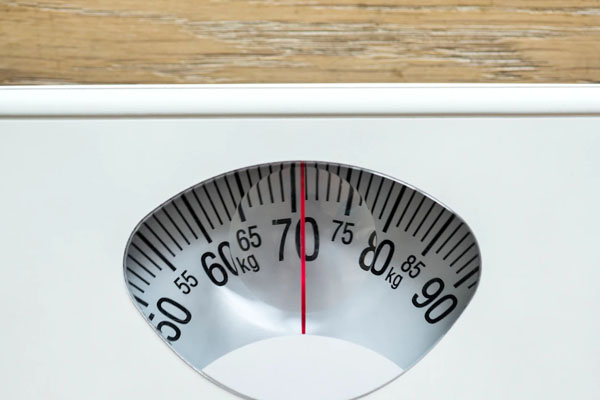
Five hours later, I finally got an email.
It’s wild. Coaches and practitioners have to be mindful of the language they’re using but also the baggage our clients are bringing to the table with that thing. It’s something that probably you will serve your clients better if it’s woven into your program. It’s not just the weight loss and all the things they can do but also some of the deeper stuff like the body image and the mindset stuff.
I resonate with what you said there because I was the same person. When I became a coach, I was like, “I’m not a life coach.” Some of this stuff felt like isn’t my area but I realized, “No, we are changing people’s lives, whether we realize it or not.” We can either change it for the better or the worst, depending on how we support them.
It’s so true. That’s how I felt. Sometimes I felt like, “I don’t know if I have the skills to help certain people.” It’s a big job that people have as health practitioners. It is more than, “Eat this, not that.” It goes so much deeper and sometimes you spend a lot of time holding space for people. What are some lifestyle interventions that we can use to promote a more weight-inclusive practice and care?
Some things that I like doing and I pull a little bit of this from intuitive eating specifically is finding out how we can make peace with food, meaning that we’re looking at food as being something that we can eat for wellbeing. Yes, there is nourishment but there’s also the importance of satisfaction. It’s being able to understand that you can enjoy and be satisfied with your food. It doesn’t have to be bland and tasteless. You can add a little flavor. There are so many different recipes and that’s one thing I support people doing.
If they like to meal plan and they don’t mind cooking, I always try to introduce them to a few of my favorite blogs out there that they can go to get recipes that are 30 minutes or less. I’m not trying to spend hours in the kitchen but also showing them that if they’re not into meal planning, which is also some clients, I always refer them to certain meal delivery services that they can use. Those are easy and quick. It has to reframe because you might think of it as frozen meals. It’s that negative perception of microwave meals as bad but it’s like, “No.” These are $10 a piece or $15 apiece. They’re not bad in any way, shape or form.
When it comes to exercise and movement, helping people reframe this idea of one big piece is you can also move without necessarily exercising. If that means having a standing desk, doing Pomodoros where you’re working in sitting for 20 minutes and 5 minutes, you get up. You go talk to your coworkers. If you work from home and are an entrepreneur and not a side hustler, you’re taking that time to maybe play with your kids if they’re still there or your dog walking around your home. It’s helping people understand that there are different things we can do in our lifestyles.
Journaling is a very powerful tool to get a lot of those thoughts that we have, especially if you’re an entrepreneur out of your head and onto paper. They’re not sticking with you and stressing you out and causing you to maybe eat and snack more than you normally would or drink more than you normally would. There are simple things that people can do but in my opinion, they’re very powerful if you look at them like, “What simple shifts could I make to my eating, exercise, movement, stress or even down to my sleep that will help me get closer to my goal in respective of following a particular diet or workout plan?”
You have the Intuitive Eating Basics for Health Coaches Guide. Can you tell us a little bit about that guide?
I put that together because when I started getting into intuitive eating and wanting to teach it to others, I realized that there wasn’t something specifically for health coaches. This bothers me because we are the people who can best support our clients and the population to make these changes. What it does is it breaks down what intuitive eating is but also different strategies that you can help your clients implement and also some things you can do for yourself because I’m a big practitioner so I should start practicing some of the things that I’m teaching my clients to do. It gives you a little template of what you can do to eat more intuitively and how you can support your clients do the same.
Is there anything else you want to leave our audience with before we sign off?
One of the things that have helped me think about weight inclusivity more is listening. I’m not going to sit there and say that everything you’re going to agree with. There are plenty of people out there that are like, “I don’t think that’s true. I don’t agree with that at all.” Giving people holding space for them to hear a part of their story helps me understand that there are some things that I do even that I’m like, “Maybe that’s not the best way to approach that. I could’ve said that better.” Listen, learn and do the best that you can.
If our audience wants to stalk you online, how can they find you?
I am @TomeshaCampbell everywhere. You can always find me on my website, AFitnessMindset.com. Thank you so much, Kendra.
I appreciate you stopping by and hanging out with us. Thank you for reading, everyone. This has been an amazing episode. I will see you next episode where I help you become wealthy AF.
Important Links
- A Fitness Mindset
- Eating Basics for Health Coaches Guide
- @TomeshaCampbell – Instagram
- https://Training.KendraPerry.net/s/lDo3UK
About Tomesha Campbell
 Tomesha is a writer, speaker, and health coach who focuses on intuitive eating principles to help people find peace with their bodies and eat mindfully for life-long health. She created A Fitness Mindset to support individuals who are looking for more information about how to make mindful choices in food without dieting or feeling deprived.
Tomesha is a writer, speaker, and health coach who focuses on intuitive eating principles to help people find peace with their bodies and eat mindfully for life-long health. She created A Fitness Mindset to support individuals who are looking for more information about how to make mindful choices in food without dieting or feeling deprived.
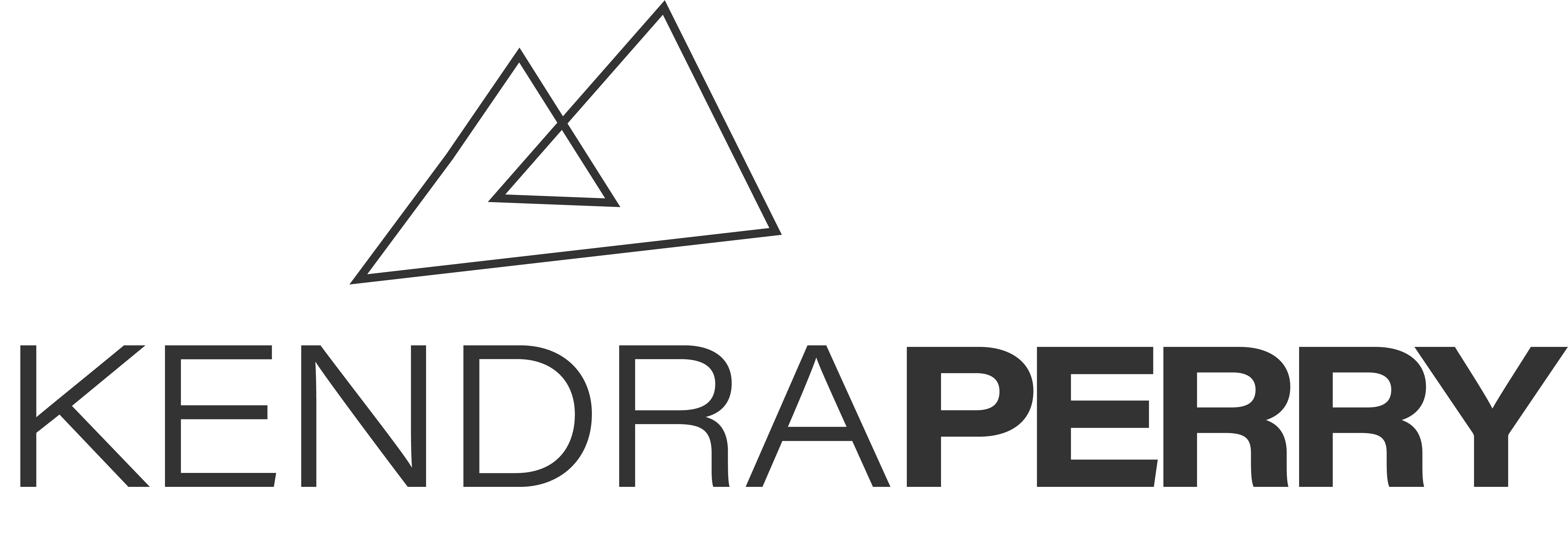
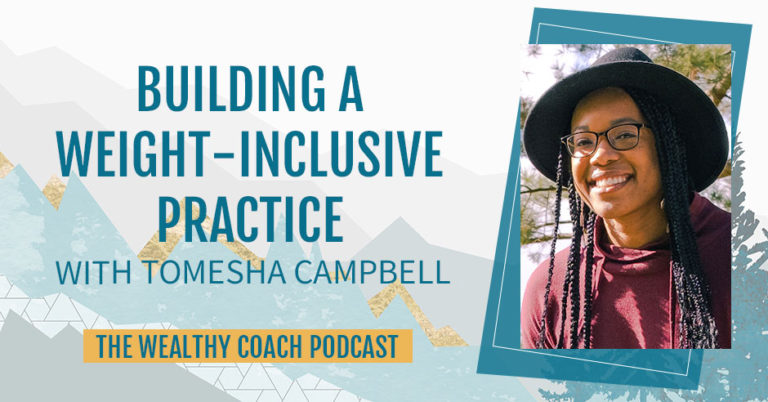
![[BEST OF] A Cautionary Tale About Your Niche](https://kendraperry.net/wp-content/uploads/2025/05/BEST-OF-A-Cautionary-Tale-About-Your-Niche-300x169.png)
